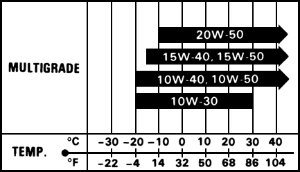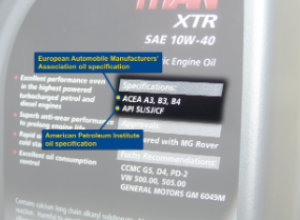The right engine oil is vital for your car to work properly, as it serves the job of lubricating the internal combustion engines. Therefore, it reduces friction and wear on moving parts and cleans the engine from sludge and varnish. However, there is no point in having oil in the car if it’s not the right one.
So, if engine oil is so important, how often should I check it?
The answer is regularly! We advise you to try to do it every couple of weeks and before any long journey. However, if you have extended service intervals, smaller capacity sumps, turbochargers and thinner, synthetic oils this can lead to higher oil usage.
The answer is regularly! We advise you to try to do it every couple of weeks and before any long journey. However, if you have extended service intervals, smaller capacity sumps, turbochargers and thinner, synthetic oils this can lead to higher oil usage.
 Engine Oil Viscosity
Engine Oil ViscosityWhen we talk about viscosity, we mean how thick or thin it is; this can change by temperature.
Engine oils are ‘multi-grade’, this way they can operate within a range of temperatures, in addition to this, additives (viscosity improvers) are used to give the oil one viscosity when cold and another when hot.
You’ll find the grades marked on the container such as 10w30 – the first number is the cold temperature grade and the second is the high-temperature grade. If you are unaware of what oil viscosity you should use, just check in your car handbook.
Where can I find this in my handbook?
- It will quote this in the manufacturer’s own specification, which you should check on the oil container as well.
- They may also give an equivalent ACEA or API specification as well – although, this may be for the “emergency top-up” only.
 Engine Oil Specifications
Engine Oil SpecificationsAll engines are unique, therefore the same applies to engine oil. With most cars nowadays, they need to be supplied with really durable oil so it lasts for many miles between services.
With numerous oils, they have the right properties to ensure your car is protected against corrosion and sludge formation and contain detergent additives to keep your engine squeaky clean.
What the different sets of standards around the world?
To conclude, we hope you now know more in detail about engine oil and its purpose, but also what the right engine oil is for your car too.
For more CarCliq guides click here
- The American Petroleum Institute (API)
- The European Constructors (CCMC/ACEA)
- The International Lubricant Standardisation and Approval Committee (ILSAC)
- The Japanese Automotive Standards Organisation (JATO)
To conclude, we hope you now know more in detail about engine oil and its purpose, but also what the right engine oil is for your car too.
For more CarCliq guides click here